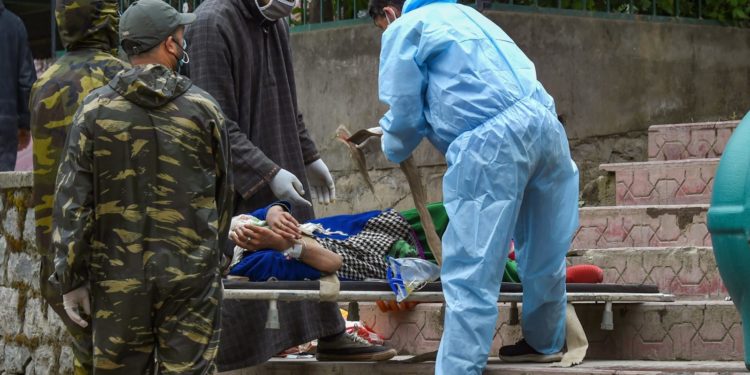THD News Desk, New Delhi: The authorities in Kashmir have directed the health services department to refrain from speaking with the journalists while its healthcare system is overwhelmed with the rage in COVID-19 cases. They also gave directions to the oxygen manufacturing units to stop supplies to the NGOs and private users.
“All Chief Medical Officers/Medical Superintendents/Block Medical officers of Kashmir Division are enjoined upon to issue instructions to all the staff under the administrative domain to desist from media interactions,” said the order signed by Dr Mushtaq Rather, director of health services in the disputed region.
Alleging misinformation being circulated in the public domain, creating ‘unnecessary and avoidable panic’, the order warned the doctors of ‘strict disciplinary action’. The order also restricted oxygen supply to the NGOs and private users working in the valley, with a direction of only supplying it to the COVID-19 designated hospitals.
A freelance journalist, Aakash Hassan last week was stopped by the guards at SKIMS when he was filming a video of a patient who had just died of COVID-19 and was being loaded in an ambulance.
“They asked who allowed us to enter the premises of the hospital,” said Hassan who has written for The Intercept, SCMP, The Guardian and others. “I spoke to the medical superintendent of the hospital who casually refused the entry saying that journalists create a scare and unnecessary panic.”
While Kashmir isn’t the first to curb the freedom of the press, Uttar Pradesh is doing it with the information on the shortage of oxygen in the state. The Supreme Court had to intervene when the social media users attending to the SOS requests were shadowbanned on Instagram and some reported deleted tweets on Twitter.
This is not the only concern COVID-19 has brought in the valley that has seen a 1300% increase in infections in a month. Although the state High Courts and the Supreme Court have been hearing pleas and petitions filed by hospitals and individuals on COVID-19, J&K High Court is still to address a single petition on the pandemic. A petition filed by Kashmiri legal researcher Farhana Latief seeking the High Court’s intervention in monitoring the preparedness of the union territory in dealing with the second wave of Covid-19 is sitting amid the pile of unheard petitions.
“What we were essentially trying to understand was how has the government augmented their healthcare capacities since last year,” she said. Lateef’s concern was the underprepared healthcare system, which is losing precious time in preparing for the impact of the second wave of the virus.
“We are not just talking about augmentation of capacities in terms of oxygen supply, but in terms of beds, ventilators, medical and paramedical staff,” Latief added. Along with the other petitioners, she asked the Court to direct the Government to expand the capacity of district-level hospitals which will prevent the tertiary care facilities at Srinagar to get overwhelmed.
The restriction on information sharing can hamper the pandemic response as Level-1 COVID hospitals like the Government Medical College (GMC) in Jammu have been facing an acute shortage of BIPAP/ventilator beds. The official sources told a daily that the COVID facility’s ICU has 22 beds, CCU 16, HDU has 30 beds and there are only 31 beds in Isolation Ward. In the six COVID-19 hospitals in the city of Srinagar, with a 1.4 million population, only 11 ICU beds were vacant last week.
Explaining the need for ventilator beds, the sources informed that a patient with oxygen saturation above 90 needs Level-3 care which is available in many hospitals. If the saturation drops anywhere between 80-90, the patients require Level-2 care facilities with high flow oxygen. “But if saturation of a COVID patient goes below 80, he needs to be put on high flow oxygen with BIPAP support. However, if any COVID patient falls unconscious, suffers a heart attack, brain stroke or ARDS (respiratory failure), he immediately requires endotracheal tube or ventilator support with high flow oxygen.”
The tally of active cases is reaching the 50,000 mark with 4353 fresh cases and 65 deaths. Jammu & Kashmir recorded the highest number of deaths due to COVID-19 in the last 24 hours till now.























